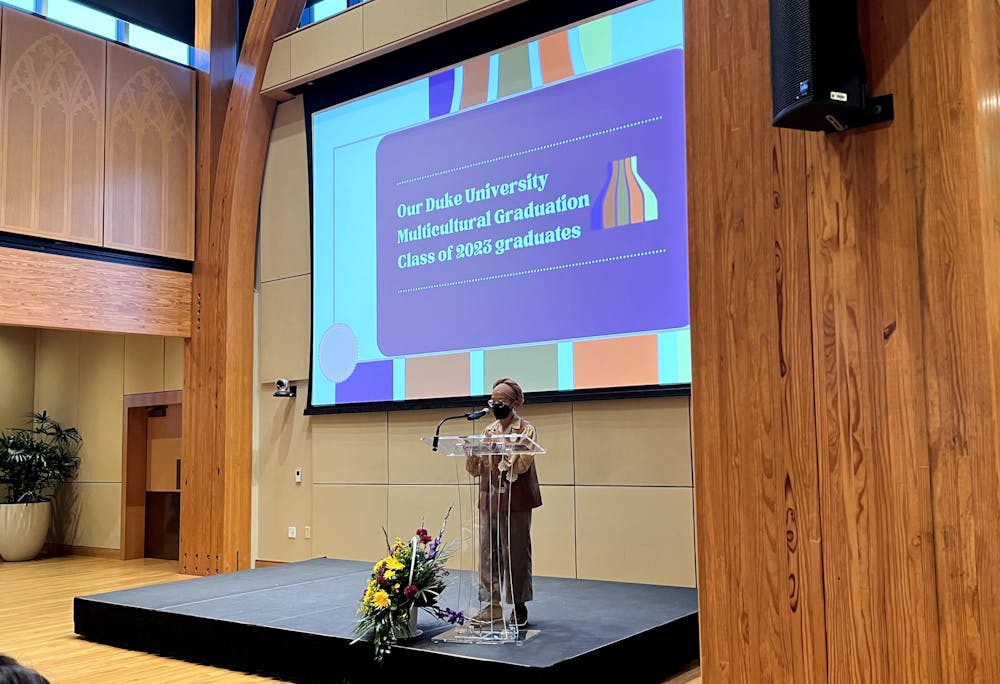The Center for Multicultural Affairs held its first Multicultural Graduation Ceremony Tuesday night.
In previous years, there have been individual celebrations for students in the Asian/American & Pacific Islander, Latinx and Native American communities. This year, the CMA celebrated “anyone who identifies within the framing of ‘multiculturalism’” as an intentional shift to “honor the [ever-evolving] representation of our student body,” according to a post from the CMA’s Instagram.
Hosting one Multicultural Graduation Ceremony was more inclusive of students who identify with multiple identities, and was “institutionally more sustainable and feasible” for staff members.
The ceremony opened with a land acknowledgment and comments from CMA staff. CMA Assistant Director Maij Vu Mai led the event’s “grounding,” inviting in the “rebirth” of a new period of graduates’ lives.
“I am because you are, and you are because I am — no graduate makes it to the stage by themselves,” Mai said, as they invited the energies of their ancestors, those present and the graduates’ descendants.
CMA Assistant Director Alex Espaillat held a welcome speech recognizing the graduating students and the communities of color they represented. She noted that the graduation honored not just the “communal and individual right to be,” but also the right to “take up the space that our predecessors demanded and cultivated with care and love.”
Several graduating students spoke as “multicultural diasporic speakers” about their experiences at Duke.
Senior Quinn Smith Jr., president of the Native American and Indigenous Student Alliance, recognized himself as part of a “space that was more important.” Smith spoke about an experience he had with Myron Dewey, a Native American documentarian activist and Duke visiting professor who passed away in 2021.
“We were looking outside at the Chapel, and he pointed out there and said, ‘The fact that you are here is an act of defiance. These institutions were built to eradicate you,’” he recalled.
Senior Kevin Rocha, president of the Duke Society of Hispanic Professional Engineers, pointed to the rich history of the communities represented at the event — a history “dominated by oportunidad y excelencia.” Rocha expressed his thanks for the support from Duke’s Latinx community and its history of activism.
“What makes la comunidad so special is that it's a place that wasn't given to us. It was fought for by Latinx students, for Latinx students. We did it all as a community," he said.
Seniors Brinda Raghavendra and Afreen Ashraf, co-presidents of the Asian Students Association, spoke about their experiences at Duke and how their identities were “constantly transformed, discovered, broken, reimagine and reborn.” While they noted that their experiences cannot represent individuals’ unique experiences as members of the AAPI community, they pointed to how these diverse experiences can create and change communities.
They also noted how the conversation “does not end here with our college journeys,” as they both look towards grappling with being Asian American and building community beyond Duke.
Sandunie Liyanagamage, a second-year master of environmental management candidate at the Nicholas School of the Environment, spoke about how a diverse community helped her become more confident in advocacy.
“Whether it is to feel supported to express ourselves in the face of narratives that confine us or to break out of the biases that limit us, building a strong community will help us face these barriers,” she said. “To my fellow graduates, no matter where you end up next, take pride in what brought you to this moment and thrive in the spaces that you have worked hard to be in.”
Following a presentation by Defining Movement from the Converge showcase and the recognition of multicultural awardees, junior Elaijah Lapay and Ana Ramirez Calderon, Trinity ‘20, presented the graduates.
Mai closed the ceremony with their final remarks and a love letter emphasizing “love, empathy and community” from a university that would be “forever changed” by the graduates.
“This time at Duke was just a drop in the ocean. The world beyond this institution and this version of yourselves holds endless possibilities,” Mai said. “Never cease to explore and reflect on who you are. You have the pleasure of spending the rest of your time on this earth re-meeting yourself.”
Get The Chronicle straight to your inbox
Sign up for our weekly newsletter. Cancel at any time.

Audrey Wang is a Trinity senior and data editor of The Chronicle's 120th volume. She was previously editor-in-chief for Volume 119.

